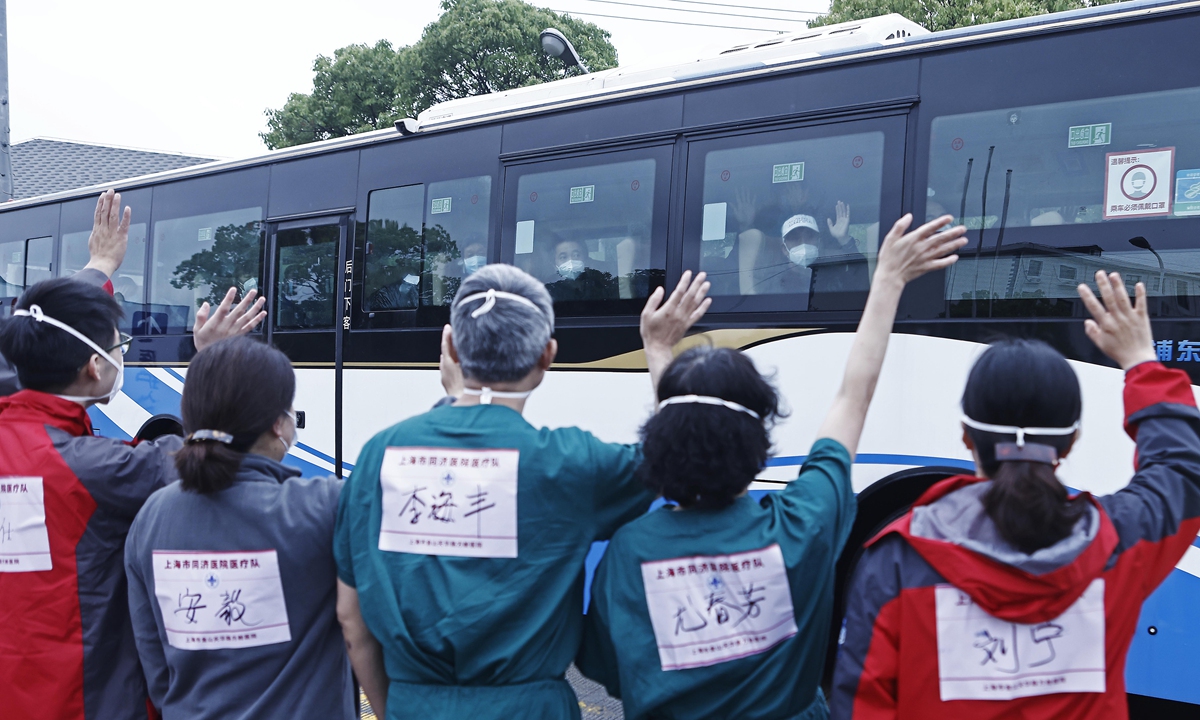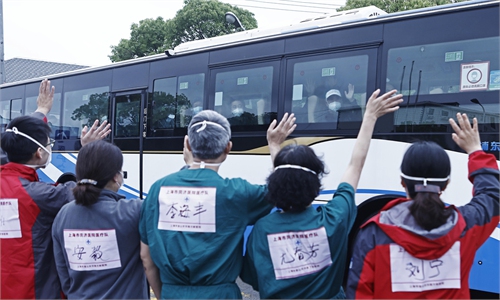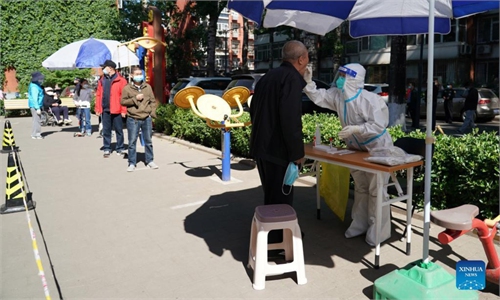
Members of a medical team wave to discharged patients at Tongji Hospital in Shanghai, May 13, 2022. The last batch of 172 patients discharged from a makeshift hospital in Jinshan District of Shanghai recovered that day. Photo: cnsphoto
Shanghai has closed half of the city-level makeshift hospitals with the gradual decline in the number of daily new infections in the city, but local health officials warned of possible epidemic rebounds in some old neighborhoods.
According to authorities at Saturday's press conference, five of 10 municipal-level makeshift hospitals have closed off, and 95 percent of the 288 makeshift points in schools are no longer in use, as the city reported 194 newly confirmed cases and 1,487 silent carriers on Friday.
With new cases declining gradually, patients treated at makeshift hospitals in Shanghai have dropped to about 50,000, one fifth of the peak number when the epidemic was at its worst, said Ding Bo, who is in charge of patient relocation work at the city's COVID-prevention task force, during a press briefing.
While epidemic prevention is steadily making progress, local health officials warned of possible epidemic rebounds in some old neighborhoods, where prevention works have a poor foundation.
Relevant departments should get a clear hold of the number of residents living in these communities as well as their living conditions, and report any potential risks immediately after they are found, the officials said.
It is necessary to strengthen the daily disinfection of the environment in key areas such as stairwells, public kitchens, public restrooms, and garbage rooms, and to carry out disinfection in the area such as rooms and buildings where infected people live, according to the press.
Yangpu district, where many old neighborhoods are located in Shanghai, reported 549 new infections on Thursday, three times the number recorded the previous day.
Residents in Yangpu district told Caixin that they ought to have received nucleic acid test once a day, but from late April to early May, they have not been tested for two weeks.
Yangpu is one of the regions in Shanghai where old neighborhoods are most concentrated. Houses in this region that are nearly 100 years old account for about one third of the city's total. In particular, houses built during the 1960s and 70s often have shared kitchens and bathrooms, which multiple households use.
Once a positive case is found in such buildings, all of the residents in the building will be transferred to centralized quarantine places, authorities said, according to Caixin.
Yangpu announced on Friday night that the district will carry out all-member nucleic acid testing for three consecutive days, adding that residents should refrain from going out except to take tests.
Two Party members from Yangpu district were held accountable for their poor performance in epidemic prevention and control, according to CCTV on Saturday. They were responsible for the inability of arranging the check-in for dozens of close-contacts in accordance with schedule after they were transferred to the isolation sites.
A 108-year-old COVID-19 patient who suffered severe symptoms has been discharged from hospital in Shanghai on Saturday after having been treated for 32 days, setting a record as the oldest patient to have recovered from the disease in China.
Shanghai has further pushed forward the resumption of production. At present, the resumption of work and production in all walks of life in Jinshan district in Shanghai is progressing in an orderly manner.
The officials said 645 of the 867 industrial enterprises above designated size in the region have resumed production as of Friday, with a production resumption rate of 74.4 percent.
Shanghai aims to reach the goal of reporting zero new COVID-19 cases at the community level by mid-May and social life including public traffic, shops and schools will resume gradually in an orderly manner, Shanghai Executive Vice Mayor Wu Qing said on Friday.
Global Times



